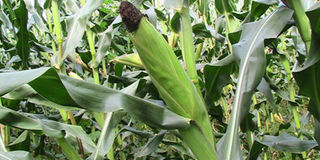Counterfeit seed keeps Ugandan farmers poor

Farmers prefer Longe 5 variety which is cheap and also gives high yield. PHOTO/FILE
What you need to know:
- As a result of fake seeds, the farmers said they are counting huge losses after they were supplied with suspect seeds that did not germinate, leading to crop failure.
Counterfeit seed continues to be a big threat to Uganda’s seed sector. Counterfeit seed reduces farmers’ confidence in certified seed due to cases in which farmers unknowingly plant inferior quality grain labelled as certified seed.
It also threatens the success of efforts to increase the adoption of improved varieties because farmers are not sure which seed is genuine.
Report findings
According to The African Seed Access Index (TASAI) report findings released recently in Kampala, 48 cases of counterfeit seed were reported in 2019.
The report, however, adds that the 48 cases are in contrast to the three cases that were reported as the official number of cases to the government.
“The three cases of counterfeit seed were related to seed supplied to Operation Wealth Creation (OWC) using formal complaint raised by the chief administrative officers of the districts where counterfeit seeds were discovered,” reads in part the report.
According to the findings, for a case to be registered by the Agriculture ministry, the complaint has to go through the formal system.
The seed companies interviewed, according to the report, revealed that the main source of counterfeit seed were agro-dealers.
Non-government organisations were also blamed for not providing suppliers with lead time to multiply high-quality seed for relief efforts.
This opened loopholes from procurement through to distribution that unscrupulous dealers took advantage of.
Counterfeit varieties
Mr Narcis Tumushabe, the chairman of Uganda Seeds Traders Association (USTA), said the most counterfeit seed on the market is Longe 5 maize variety and open-pollinated maize variety which is easy to grow and was highly promoted among farmers.
“When farmers are going to grow crops, they think about the most affordable seed on the market which is Longe 5 maize variety, so the people who deal in counterfeit, will also put a similar product on the market to attract farmers’ attention,” he said.
The other most counterfeit seed are the hybrids which yield more hence have high demand.
Farmers, according to Mr Tumushabe, want to use the seed for their farming practices to be more productive and that is what practitioners of counterfeiting look out for.
“Farmers want a brand that can give them good results and varieties that are high yielding, so the counterfeiters always look for that variety that farmers are demanding, “ he added.
Raw deal
This has resulted in farmers getting a raw deal since they pay for something which does not meet the quality of what they expect.
Because of counterfeit seeds, many farmers are frustrated, have no motivation for buying improved seeds, they just feel like all companies are selling fake seeds because of the experience of working with counterfeit traders.
Seed traceability system
The government through the Ministry of Agriculture, Animal Industry and Fisheries (MAAIF) has developed a seed traceability system that will track early generation seed so as to control counterfeits.
Early generation seed involves the breeding of improved varieties that are given to seed breeders for multiplication and supply.
Mr Moses Erongu, a senior seed inspector in the MAAIF said during the report launch that the system that was briefly interrupted by the recent lockdown due to the second wave of Covid-19 is in the final stages to be rolled out.
He said most of the bad vices in the seed business start from access to early generation seed.
“We feel that when this system starts giving us that information right from the producers of early generation seed like quantities produced, companies that took the seed for multiplication, among others, we may not expect another company to claim to have seed of the same variety when they did not access early generation seed or parent material,” Mr Erongu added.
Apart from tracing early generation seed, the system will help in the registration of seed crop growers, reduce physical deliveries of documents such as returns in time, record the amount of seed produced per season based on the quantity of early generation seed secured among others.
“So knowing who has grown what, and where, will be done online and we shall be able to know the amount of seed being produced in the country. If you know how much has been planted then planning for quality assurance and inspection becomes easy,” he added.
Quality
Seed is not just anything packed in the paper but should have gone through the processes that are fully supervised to ensure that this seed meets most of the requirements and standards.




